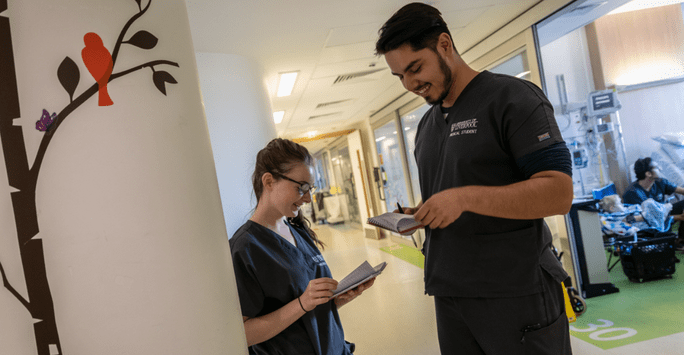
Your e-portfolio serves as a log of your clinical learning throughout medical school and is your personal bank of evidence that demonstrates the clinical skills and techniques you have developed.
It helps prepare you for a lifelong commitment to self-reflection, a practice that will continue continues throughout your future medical career, and is an excellent opportunity to showcase your learning experience that will come in handy for applications and further training post-graduation.
So how best to make use of this resource as you make your way through the academic year? E-portfolio Administrator Faye Sharpe and School Careers Adviser Jennifer Connell share their top tips!
Evidence your experience
“Your E-Portfolio is something which you will take with you after you graduate and is an excellent resource which you can use for years to come as evidence of your skills and which you can use as feedback for future job opportunities.
Use it to showcase yourself as a future doctor who is interested in growing and refining their skills.
When it comes to your approach, I recommend completing and evidencing far more than the minimum requirements for each placement and attaching them to your Clinical Activity Workbook. I always emphasise that it’s important to include all of the forms which have been completed, not just the ‘best ones’.
These additional experiences will help expand your skillset and increase your confidence, and having them presented in your workbook will showcase your journey through placements, not to mention your commitment to learning.
It’s an excellent way of showing how hard you are working to gain experiences towards becoming an excellent F1 doctor.”
- Faye Sharpe, E-portfolio Administrator
Build your career pathway
As you retain access to your e-portfolio after graduation, all of the experiences and evidence you collect can be used in your future career.
The Careers Supporting Logbook provides a space for you to demonstrate achievements of excellence and evidence of clinical activity aligned to your chosen career pathway, including your participation in clinical events and extra-curricular activities.
“The Career Supporting Logbook is an ideal way to seize an opportunity to demonstrate your growing commitment to a particular specialty. Competition for specialty training posts is strong, for some fierce.
Activities such as research projects, writing an article for publication, presenting at a conference, getting involved in teaching, leadership activities, entering an essay competition or participating in a clinical audit or quality improvement project are all excellent examples to include in your logbook.
Manage your time well, and choose activities that you think you will enjoy, rather than feeling that you have to do too many things. But whatever you do, undertake at least one or two of these activities, especially if you have your sights set on a competitive specialty or applying for the Specialised Foundation Programme.
Should you change your mind about pursuing a particular specialty at a later point, the activities you undertake will also help you develop skills that are transferrable across specialties. Be sure to document them all in your logbook.”
- Jennifer Connell, School Careers Adviser
Earn a portfolio prize
Don’t forget, Year Five students also have the opportunity to submit their e-portfolio for the Reginald and Dora Goodrick Portfolio Prize (link), a School Prize awarded for excellence in performance in a portfolio of work across Year 5. Great for your CV!
FY1 Dr Denise Brown, who picked up the prize last academic year, encourages students to make the most of the portfolio and to use it as an opportunity to reflect on what you have learnt, as well as highlight areas where you succeed and those which need more attention.
Working as a doctor has made me realise how useful the portfolio is; especially with building confidence in dealing with acutely unwell patients and practical procedures.
"The F1 portfolio has many similarities to the Year 5 portfolio and therefore it makes you more prepared for next year and onwards in your career.”
Discover more
- Keep an eye on the Weekly Student Bulletin for upcoming tailor-made sessions by Specialty experts on how you can develop your portfolio to enhance your future specialty application.
- More information on the e-portfolio, including Student Guides, can be found on the E-portfolio page of the student intranet (link).
- Further career boosting tips and resources are available on the Careers Support web area (link) including the option of booking an individual careers appointment with School Careers Adviser Jennifer Connell.